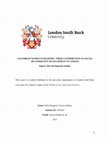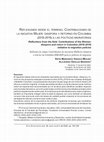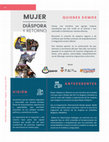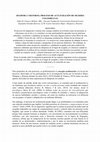Thesis Chapters by Sofía Vinasco Molina
Un mutis por Gorgias o el discurso de la mujer en silencio., 2012
El siguiente trabajo reflexiona acerca de si es posible la comunicación, a partir de los
planteam... more El siguiente trabajo reflexiona acerca de si es posible la comunicación, a partir de los
planteamientos de Gorgias de Leotinos por un lado y de Paul Watzlawick y Adolfo Gumucio Dagron por el otro. Dado que no son desconocidas las múltiples dificultades que encontramos en el acto mismo de comunicarnos, estudiosos contemporáneos creen contrario a Gorgias, que sí es posible y de hecho consideran necesaria la comunicación en procesos sociales.

his research is aiming to identify the contribution to social and/or community development of the... more his research is aiming to identify the contribution to social and/or community development of the Colombian women in diaspora in London. Bearing in mind that the Colombians are the second largest population in London, and women are the majority, this dissertation will analyse the difference by gender between Colombian women’s profile and the profile of Colombian migrants in London. Based on a gendered approach, this research will identify the milestones along women process in London as well as the main working areas and leadership positions. Using both, qualitative and quantitative methodology primary and secondary data have been analysed. 23 surveys have been collected and 6 in-depth interviews were conducted. The results shows that 100% of Colombian women interviewed have participated in a wide range of activities oriented to help the community in London. The starting point for the majority has been a volunteering position, however others have occupied public positions from where also can contribute. Colombian women in London have been contributing in the last three decades to community and social development in London. Further research is needed for a better understanding of this topic. Also, research focusing on men is important in order to balance the knowledge and research more in depth about the psycho-social process on migrant women.
Key words: development, gender, migration, women, diaspora, Colombia, London.
Papers by Sofía Vinasco Molina
(Trans)fronteriza , 2024
Este trabajo aborda la situación del retorno y cómo durante y postpandemia las mujeres se encuent... more Este trabajo aborda la situación del retorno y cómo durante y postpandemia las mujeres se encuentran con diversos retos para poder acceder al sistema de salud y navegarlo. Se enfatizan las dificultades del retorno de mujeres mayores que se encuentran con un sistema al que no pertenecieron durante años laborales y que no las considera.

Acta Sociológica, 2024
El siguiente trabajo retoma los resultados reportados por la iniciativa Mujer: diáspora y retorno... more El siguiente trabajo retoma los resultados reportados por la iniciativa Mujer: diáspora y retorno en dos proyectos realizados durante los años 2018 y 2019 en las ciudades de Bogotá y Medellín-Colombia. Las participantes retornaron al país luego de vivir entre 6 meses y 20 años en condición migrante. A través del análisis temático y la lente interseccional volvimos sobre las experiencias documentadas por la iniciativa para identificar posibles impactos psicosociales del retorno, así como potenciales contribuciones a los debates actuales sobre políticas migratorias de nuestro país. Encontramos que más allá de la raza-clase y el género, también es importante indagar sobre la edad al regresar, así como también es relevante conocer más acerca de cómo las tareas de cuidado pueden impactar en los procesos de reintegración laboral y social en esta vuelta a casa.
Discutimos acerca de la importancia de políticas migratorias inclusivas que consideren las diversas realidades de las mujeres retornadas, así como la necesidad de fortalecer las redes de apoyo social y laboral. Se sugiere incorporar una mirada interseccional en futuras investigaciones y acciones corte participativo y feminista para abordar las complejidades de la migración de retorno de las mujeres de manera integral y equitativa.
Palabras clave: Migración de retorno, mujeres colombianas, políticas migratorias, interseccionalidad, impactos psicosociales.
Journal of Neurology & Stroke
We present the case of two children of 7 and 8years old, who have been referred from teachers and... more We present the case of two children of 7 and 8years old, who have been referred from teachers and school counsellors for evaluation by health professionals, on suspicion of presenting a clinical feature of ADHD. Although this diagnosis has been repeatedly dismissed, the educational institution continues tackling the behavioural problems under this label, making constant petitions of assessment to the health system. The need for generating communication channels between the institutions in charge of the management of children with behavioural problems is discussed with the aim of avoiding cost overruns in the health system and reducing the psychosocial impact of the stigma associated with the diagnosis of ADHD.
Journal of Neurology & Stroke
We present the case of two children of 7 and 8years old, who have been referred from teachers and... more We present the case of two children of 7 and 8years old, who have been referred from teachers and school counsellors for evaluation by health professionals, on suspicion of presenting a clinical feature of ADHD. Although this diagnosis has been repeatedly dismissed, the educational institution continues tackling the behavioural problems under this label, making constant petitions of assessment to the health system. The need for generating communication channels between the institutions in charge of the management of children with behavioural problems is discussed with the aim of avoiding cost overruns in the health system and reducing the psychosocial impact of the stigma associated with the diagnosis of ADHD.

Mujer: diáspora y retorno. Informe Fase II-2019, 2019
Somos una iniciativa que agrupa mujeres colombianas que han vivido en el exterior y han retornado... more Somos una iniciativa que agrupa mujeres colombianas que han vivido en el exterior y han retornado a Colombia por razones diversas. Buscamos la creación de espacios seguros y de confianza que faciliten procesos de empoderamiento e integración social y laboral. Nos interesa aportar en la construcción de paz, memoria y convivencia del país. Para ello, nos hemos apoyado en la experticia de nuestras integrantes en temas como género, autocuidado, emprendimiento social, liderazgo, memoria, migraciones, entre otros. Asumimos que las mujeres migrantes y retornadas son actoras sociales, llenas de conocimientos, experiencias y capacidades que permiten contribuir en los cambios sociales, políticos y económicos locales. La experiencia de la migración y del retorno hace parte del capital humano que puede ser útil para transformar las prácticas negativas de convivencia en nuestro país. Mujer: Diáspora y Retorno es una iniciativa de sociedad civil que nace a finales del 2017 en Bogotá, Colombia, la cual se nutre del trabajo y experiencias de las mujeres que integran la iniciativa europea Mujer Diáspora. Así, la Cooperación Internacional decide apoyar desde 2018 la fase piloto, para reconocer cuál es la cara de la migración de retorno de las mujeres en Colombia (Bogotá y Medellín). Dados los importantes hallazgos, se continúa con una segunda fase en 2019 orientada al fortalecimiento de conocimientos y competencias que nos permitan dar sostenibilidad a nuestra iniciativa y ampliar el campo de acción en el mediano y largo plazo.
Mujer: Diáspora y Retorno. Informe Ejecutivo de Actividades, Medellín-Bogotá, 2018
Este informe ejecutiva presenta los resultados derivados de la investigación participativa realiz... more Este informe ejecutiva presenta los resultados derivados de la investigación participativa realizada por la iniciativa Mujer: Diáspora y Retorno desde una aproximaxión psicosocial y utilizando métodos mixtos de investigación.
Categorías de análisis como las expectativas e imaginarios, las políticas migratorias y la identidad del ser mujer son resultado del análisis.
Conference Presentations by Sofía Vinasco Molina

The process of migration and return brings with it changes in the way people relate to others and... more The process of migration and return brings with it changes in the way people relate to others and constitutes an opportunity to learn new cultural practices and to question and rethink one's own. For some authors such as Berry et al. (2006) and Ferrer et al. (2014) this is called acculturation. Among the forms of acculturation we find assimilation and integration
as ways of adopting the new culture and leaving aside one's own or integrating them in a dialectical exercise. However, acculturation as an asymmetrical and unilateral process falls short of explaining the cultural impacts that diasporas have on the host place, and it is then that the complexity in the analysis of human systems and their movements allows us to see that when one social and cultural set interacts with another, it is generally unlikely to be able to return to its original state. Looking at the particular experience of migrant women invites us to ask what happens to them and their roles in the host place and how the return makes visible changes to what is traditional and familiar at home.











Uploads
Thesis Chapters by Sofía Vinasco Molina
planteamientos de Gorgias de Leotinos por un lado y de Paul Watzlawick y Adolfo Gumucio Dagron por el otro. Dado que no son desconocidas las múltiples dificultades que encontramos en el acto mismo de comunicarnos, estudiosos contemporáneos creen contrario a Gorgias, que sí es posible y de hecho consideran necesaria la comunicación en procesos sociales.
Key words: development, gender, migration, women, diaspora, Colombia, London.
Papers by Sofía Vinasco Molina
Discutimos acerca de la importancia de políticas migratorias inclusivas que consideren las diversas realidades de las mujeres retornadas, así como la necesidad de fortalecer las redes de apoyo social y laboral. Se sugiere incorporar una mirada interseccional en futuras investigaciones y acciones corte participativo y feminista para abordar las complejidades de la migración de retorno de las mujeres de manera integral y equitativa.
Palabras clave: Migración de retorno, mujeres colombianas, políticas migratorias, interseccionalidad, impactos psicosociales.
Categorías de análisis como las expectativas e imaginarios, las políticas migratorias y la identidad del ser mujer son resultado del análisis.
Conference Presentations by Sofía Vinasco Molina
as ways of adopting the new culture and leaving aside one's own or integrating them in a dialectical exercise. However, acculturation as an asymmetrical and unilateral process falls short of explaining the cultural impacts that diasporas have on the host place, and it is then that the complexity in the analysis of human systems and their movements allows us to see that when one social and cultural set interacts with another, it is generally unlikely to be able to return to its original state. Looking at the particular experience of migrant women invites us to ask what happens to them and their roles in the host place and how the return makes visible changes to what is traditional and familiar at home.
planteamientos de Gorgias de Leotinos por un lado y de Paul Watzlawick y Adolfo Gumucio Dagron por el otro. Dado que no son desconocidas las múltiples dificultades que encontramos en el acto mismo de comunicarnos, estudiosos contemporáneos creen contrario a Gorgias, que sí es posible y de hecho consideran necesaria la comunicación en procesos sociales.
Key words: development, gender, migration, women, diaspora, Colombia, London.
Discutimos acerca de la importancia de políticas migratorias inclusivas que consideren las diversas realidades de las mujeres retornadas, así como la necesidad de fortalecer las redes de apoyo social y laboral. Se sugiere incorporar una mirada interseccional en futuras investigaciones y acciones corte participativo y feminista para abordar las complejidades de la migración de retorno de las mujeres de manera integral y equitativa.
Palabras clave: Migración de retorno, mujeres colombianas, políticas migratorias, interseccionalidad, impactos psicosociales.
Categorías de análisis como las expectativas e imaginarios, las políticas migratorias y la identidad del ser mujer son resultado del análisis.
as ways of adopting the new culture and leaving aside one's own or integrating them in a dialectical exercise. However, acculturation as an asymmetrical and unilateral process falls short of explaining the cultural impacts that diasporas have on the host place, and it is then that the complexity in the analysis of human systems and their movements allows us to see that when one social and cultural set interacts with another, it is generally unlikely to be able to return to its original state. Looking at the particular experience of migrant women invites us to ask what happens to them and their roles in the host place and how the return makes visible changes to what is traditional and familiar at home.